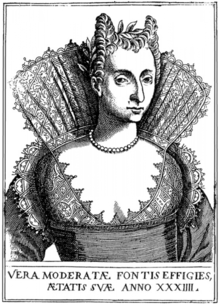Modesta Pozzo
| Modesta di Pozzo di Forzi | |
|---|---|
 |
|
| Born | 1555 |
| Died | c. 1592 |
| Pen name | Moderata Fonte |
| Language | Italian |
| Nationality | Italian |
| Period | 16th century |
| Subject | Feminism |
| Notable works | The Worth of Women |
|
|
|
Moderata Fonte, pseudonym of Modesta di Pozzo di Forzi (or Zorzi), also known as Modesto Pozzo (or Modesta, feminization of Modesto), (1555–1592) was a Venetian writer and poet. Besides the posthumously-published dialogue, Il merito delle donne (The Worth of Women, 1600) for which she is best known, she wrote a romance and religious poetry. Details of her life are known from the biography by Giovanni Niccolò Doglioni (1548-1629), her uncle, included as a preface to the dialogue.
Pozzo's parents, Girolamo da Pozzo and Marietta da Pozzo (née dal Moro), died of the plague in 1556, when she was just a year old, and she and her older brother Leonardo were placed in the care of their maternal grandmother and her second husband. She spent several years in the convent of Santa Marta where, thanks to her extraordinary memory, she was often displayed as a child prodigy. She was able to repeat long sermons she had heard or read only once. At the age of nine she was returned to her grandmother’s family where she learned Latin and composition from her grandfather, Prospero Saraceni, a man of letters, as well as from her brother, Leonardo. Her brother also taught her to read and write in Latin, draw, sing, and play the lute and harpsichord.
On 15 February 1582, at twenty-seven years old, Pozzo wed Filippo de’ Zorzi. Their marriage appears to have been a particularly good one because de’ Zorzi returned her dowry a year and a half after their wedding. An official document dated October 1583 states that de’ Zorzi returns the dowry “thanks to his pure kindness and to the great love and good will that he has felt and feels for” Pozzo.
One of Pozzo’s first known works is a musical play performed before the Doge Da Ponte in 1581 at the festival of St. Stephen’s Day. Le Feste [The Feasts] includes about 350 verses with several singing parts. Also in 1581, she published her epic poem I tredici canti del Floridoro [The Thirteen Cantos of Floridoro] dedicated to Bianca Cappello and her new husband, Francesco I de' Medici, the Grand Duke of Tuscany. This poem is perhaps the second chivalric work published by an Italian woman, after Tullia d’Aragona’s Il Meschino, which appeared in 1560.
Pozzo wrote two long religious poems, La Passione di Cristo [Christ’s Passion] and La Resurrezione di Gesù Cristo nostro Signore che segue alla Santissima Passione in otava rima da Moderata Fonte [The Resurrection of Jesus Christ, our Lord, which follows the Holy Passion in octaves by Moderata Fonte]. In these works she describes in detail the emotional reactions of the Virgin Mary and Mary Magdalen to Christ’s death and resurrection, illustrating her deep belief in the active participation of women in the events of the Passion and Resurrection of Christ.
...
Wikipedia
